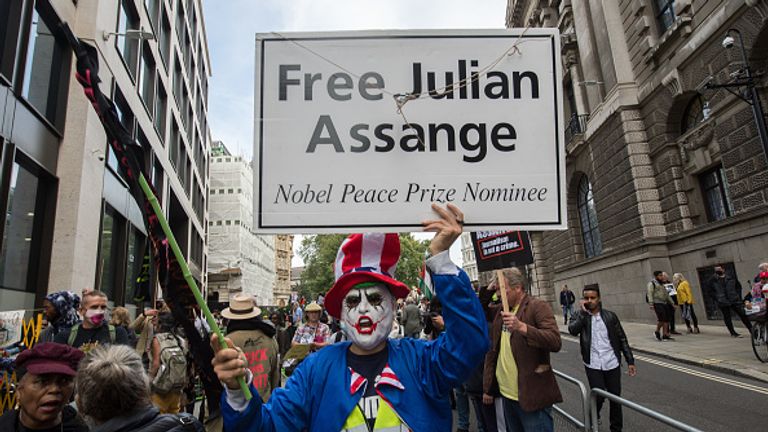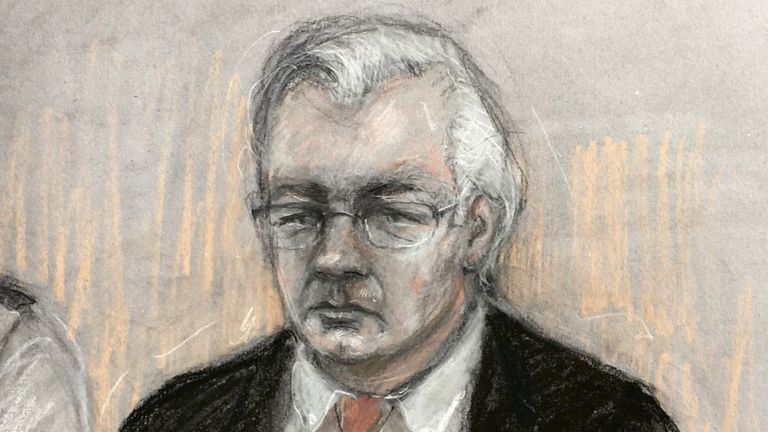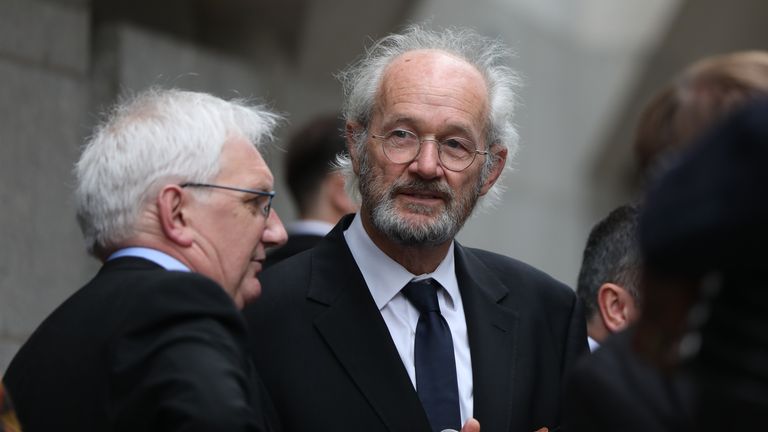The new US indictment, filed in June, contains 18 charges and was handed to Assange moments before he appeared at the Old Bailey
Monday 7 September 2020 15:21, UK

Julian Assange has failed to get new allegations against him thrown out as he battles extradition to the US.
The WikiLeaks founder, 49, appeared at the Old Bailey in London after being held for months on remand at high-security Belmarsh Prison.
He was re-arrested in the court's cells on Monday over new charges contained in a US indictment.
It details a further 18 charges, lodged in June, which accuse him of plotting to hack computers and obtain and disclose national defence information.
 Image:An artist's impression of Assange in the dock at the Old Bailey on Monday
Image:An artist's impression of Assange in the dock at the Old Bailey on MondayThey allege that he conspired with army intelligence analyst Chelsea Manning to crack a scrambled password, known as "hash", to a classified US defence department computer.
The charges also offer further details of alleged hacking plotters that Assange and his WikiLeaks colleagues are said to have recruited.
The 49-year-old spoke only to state he "does not consent to extradition" and confirm his name.
Assange, who is wanted in the US for publishing hundreds of thousands of classified documents in 2010 and 2011, was clean-shaven with short hair and wore glasses, a dark suit, maroon tie and white shirt.
If convicted, he faces a maximum possible sentence of 175 years in jail.
\Image:Fashion designer Vivienne Westwood was outside court
His lawyer, Mark Summers QC, said the "fresh allegations at the 11th hour" were brought without warning or explanation, which meant they had no time to prepare a response.
He highlighted the difficulties Assange faced in speaking to his lawyers in the midst of ongoing restrictions.
"It would be an impossible task for the defence to deal with these fresh allegations in any meaningful way in the time that has been afforded to them, and that time is a matter of weeks in respect of which we are provided absolutely no explanation for the late arrival of these matters."
He added: "What is happening is abnormal, unfair and liable to create injustice if allowed to continue."

But District Judge Vanessa Baraitser rejected the defence's bid to "excise" the allegations, saying: "These are issues which must take place in the context of considering the extradition request and not before it."
Outside court, hundreds of protesters gathered in support of Assange, including his father John Shipton and fashion designer Vivienne Westwood.
She said: "I'm an activist, I am very frightened, I've lost days and years of sleep worrying about Julian Assange.
"Julian Assange is the trigger, he is shining the light on all the corruption in the world."

His father described the proceedings as an "abuse trial", which his defence claims has been targeted by Donald Trump's re-election campaign for "political reasons".
His partner, Stella Moris, who he shares two children with, was in the public gallery after delivering an 80,000-signature petition against his extradition to Downing Street.
Dozens of witnesses are expected to be called to give evidence at the Old Bailey over the four-week hearing, with the judgment likely to be delivered at a later date.
Assange has been on remand in Belmarsh Prison since last September after serving a 50-week sentence for breaching bail conditions while he was in London's Ecuadorian embassy for nearly seven years.
Issued on: 07/09/2020
Text by: NEWS WIRES
A London hearing resumes on Monday to decide if WikiLeaks founder Julian Assange should be extradited to the United States to face trial over the publication of secrets relating to the wars in Afghanistan and Iraq.
The 49-year-old Australian, who is currently being held on remand at a high-security jail, faces 18 counts from US prosecutors that could see him jailed for up to 175 years.
The hearing at the Central Criminal Court, the Old Bailey, is due to last three to four weeks. It had been due to go ahead in April but was delayed due to the coronavirus outbreak.
Any ruling is "almost certain" to be appealed by the losing side, according to John Rees, of the Don't Extradite Assange Campaign, raising the prospect of more time behind bars for the former hacker.
Rees told AFP that Assange -- who has become a figurehead for press freedom and investigative journalism -- had a "very strong defence" but was concerned the case was "highly politicised".
Assange's French lawyer talks to FRANCE 24 as London extradition hearings resume
509000
A previous hearing in February was told that US President Donald Trump had promised to pardon Assange if he denied Russia leaked emails from the campaign of Hillary Clinton, Trump's opponent in the 2016 election.
Assange faces charges under the US Espionage Act for the 2010 release of 500,000 secret files detailing aspects of US military campaigns in Afghanistan and Iraq.
Washington claims he helped intelligence analyst Chelsea Manning to steal the documents before recklessly exposing confidential sources around the world.
At the February hearing, Assange's lawyer, Edward Fitzgerald, said his client would not get a fair trial in the United States and would be a suicide risk.
James Lewis, representing the US government, said WikiLeaks was responsible for "one of the largest compromises of classified information in the history of the United States".
"Reporting or journalism is not an excuse for criminal activities or a licence to break ordinary criminal laws," he added.
'Extradition will be a death sentence'
Assange's partner and the mother of his two young sons, South African-born lawyer Stella Moris, attempted to secure his release in March, claiming he was in danger inside prison during the coronavirus lockdown.
"The life of my partner, Julian Assange, is at severe risk," she said, arguing that Covid-19 was "spreading within (the) walls" of Belmarsh prison in south London.
In an interview published in The Times newspaper on Saturday, Moris, 37, said: "For Julian, extradition will be a death sentence."
She said she feared he would take his own life, and that his sons, who were conceived during his asylum in Ecuador's London embassy, would grow up without a father.
Assange appeared weak and confused during his February court appearance, apparently forgetting his date of birth. He also told district judge Vanessa Baraitser he had not understood what had happened in the hearing.
His legal team has repeatedly warned about his health and an independent UN rights expert said in November that his continued detention was putting his life at risk.
Meanwhile, the Council of Europe rights group warned that Assange's extradition would have a "chilling effect" on press freedom.
Other high-profile supporters of Assange include the Pink Floyd co-founder Roger Waters, "Baywatch" star Pamela Anderson, designer Vivienne Westwood, and Greece's former finance minister Yanis Varoufakis.
The saga began in 2010 when Assange faced allegations of sexual assault and rape in Sweden, which he denied.
He was in Britain at the time but dodged an attempt to extradite him to Sweden by claiming political asylum in Ecuador's embassy in London.
For seven years he lived in a small apartment in the embassy, but after a change of government in Quito, Ecuador lost patience with its guest and turned him over to British police in April 2019.
Swedish prosecutors confirmed last year they had dropped the rape investigation, saying that despite a "credible" account from the alleged victim there was insufficient evidence to proceed.
(AFP)
As British show-trial resumes: The working class must defend Julian Assange!
By Oscar Grenfell
7 September 2020
The latest stage in the decade-long persecution of Julian Assange begins today, with the final three weeks of British court hearings for the extradition of the WikiLeaks publisher to the US, where he faces 175 years in prison for exposing American war crimes, human rights violations, coups and meddling operations around the world.
Whatever the court decides will likely be subject to years of legal appeal, but the scenario that Assange has warned of for the past ten years—that he risks being hauled before a secret US court, prosecuted for lawful publishing activities and thrown into a hellhole run by his CIA persecutors—is all too real.
The innumerable pundits and media commentators who derided these warnings as a conspiracy theory and promoted the slanders used to undermine public support for Assange have fallen silent. The legal travesty underway in the land of the Magna Carta either goes unmentioned in the official press, or is discreetly buried in brief columns halfway through the papers.
The hearings are only proceeding because the attempt of the British state to kill Assange by exposing him to the danger of coronavirus infection has so far failed.
Throughout the pandemic, Assange has been held in the maximum-security Belmarsh Prison, where he has been denied a mask or any other protection, even as dozens of inmates and staff have contracted COVID-19. A bail application has been contemptuously dismissed, despite the fact that Assange has been convicted of no crime, as have warnings that his health continues to deteriorate.
Assange, facing the most consequential legal proceedings of his life, has been unable to meet with his lawyers for the past six months. Weeks before the resumption of the trial, US prosecutors filed a superseding indictment, based on the lies and slanders of FBI informants, over a year after they were required to submit their final charge sheet. The transparent purpose was to inundate Assange’s legal team with tens of thousands of documents, after they had finished preparing their case, to prevent even the possibility of a defence.
As a matter of law, the US extradition request should have been thrown out as soon as it was submitted.
It violates innumerable treaties, laws and international conventions, including a ban on extraditions from Britain to the US for political offenses, prohibitions on the refoulement of those who have secured asylum to their persecutors and an absolute proscription on subjecting anyone to the likelihood of cruel, inhuman and degrading treatment or punishment, which Assange would unquestionably face in the US.
The WikiLeaks founder’s defence is expected to submit detailed evidence establishing that the CIA illegally surveilled Assange when he was a political refugee in Ecuador’s London embassy. His legal meetings were intercepted, in a flagrant breach of attorney-client privilege, and his infant child was spied upon, in a violation of fundamental human rights.
Despite the lawlessness, the hearings proceed, with the backing of the entire British political, media and legal establishment. The case is overseen by a judge whose husband has the closest ties to the intelligence agencies and the military. The Conservative government and the Labour opposition explicitly support the show-trial. The unions and the pseudo-left are opposed to any defence of Assange.
The line-up is proof that the only viable political strategy to fight for Assange’s freedom is one based upon the independent mobilisation of the working class against all of the official parties and the profit system that they defend.
Assange’s dire plight cannot be understood in isolation. It is one of the sharpest expressions of a turn to authoritarianism and censorship by governments around the world, amid a breakdown of capitalism, an escalation of imperialist militarism and the emergence of major class struggles.
The very governments persecuting Assange are at war with the population. In Britain, the US and Australia they have pursued a homicidal response to the pandemic, based on exposing millions of workers to a deadly virus so that capitalist production and corporate profits can continue.
Ordinary people are being made to pay for the economic crisis accelerated by the pandemic. Mass unemployment, the gutting of welfare and jobless payments and a stepped-up assault on wages and conditions goes hand in hand with government handouts of trillions of dollars to the banks, financial speculators and oligarchs.
The class war at home is accompanied by escalating war abroad, exemplified by continuous US provocations and threats against China and Russia, which risk a global nuclear conflagration.
None of this is compatible with democratic norms. Well aware that their criminal policies are inflaming mass social and political opposition from below, the ruling elites are responding with the blunt instruments of repression.
The US authorities, who want to destroy Assange, have, for the past three months, overseen state violence against mass protests in opposition to police killings. The turn to dictatorial methods is epitomised by Trump’s threats to illegally deploy the military against domestic opposition and his attempts to cultivate a fascistic movement.
His nominal opponent, Democratic Party presidential candidate Joe Biden, is rallying support from war criminals and the intelligence agencies. Biden’s program is internet censorship, military confrontation with Russia and China and trillions more for Wall Street.
The unanimity of the ruling elite in the assault on democratic rights is summed-up by the fact that the two official candidates in November’s US presidential election, Biden and Trump, both support the prosecution of Assange, which is a frontal assault on the press freedom enshrined in the US Constitution by the American Revolution. A similar bipartisanship is evident in every other country.
Desperate illusions that a section of the political establishment would come to Assange’s aid now take on the character of hopeless delusions.
Former British Labour leader Jeremy Corbyn, who occasionally claimed to be a socialist, refused to defend Assange and has handed over control of the party to the Blairites. Bernie Sanders, who said that he was waging a “political revolution” through the big business Democratic Party, but would not even mention Assange’s name, is Biden’s most enthusiastic supporter.
The promotion of such bankrupt figures, including by organisations like the official Don’t Extradite Assange campaign group, has only served to demobilise and disorient the latent mass support for the WikiLeaks founder, and direct it behind the very forces responsible for Assange’s persecution.
Experience has shown that the social force that can and must take forward the fight for his freedom is the international working class. All over the world, teachers, auto workers, medical staff and many others are entering into struggle against the governments and corporate elites that have imperilled their lives during the pandemic, and attacked their social and democratic rights.
The persecution of Assange is not only aimed at silencing forever a courageous journalist and publisher who has exposed historic war crimes. It is an attempt to intimidate this emerging movement and establish a precedent for far broader victimisations and frame-ups.
But just as the working class will not accept the turn towards dictatorship, so it must defend Assange.
The World Socialist Web Site appeals to workers, students and young people to become active in the fight to block Assange’s extradition and secure his unconditional release. The fight for his freedom is your fight! It is inseparable from your struggles against inequality, the corporate onslaught on social conditions and the capitalist system that is responsible for the global crisis.
We encourage the broadest meetings and discussions in neighbourhoods, schools, universities and workplaces, along with public protests and rallies, where it is safe for them to be held. Resolutions should be adopted at workplaces, demanding an end to the persecution of Assange and calling on other sections of the working class to join this struggle.
No comments:
Post a Comment